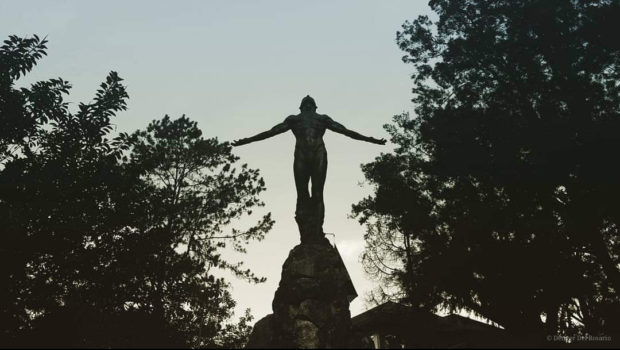
The Oblation, the iconic symbol of the University of the Philippines signifying selfless offering of oneself to his country, stands in its Baguio campus. (Photo by Denver Del Rosario)
MANILA, Philippines — At least 35 professors emeriti of the University of the Philippines (UP) on Thursday defended officials of the Diliman campus, who were earlier criticized by the chair of the Commission on Higher Education (CHEd) for opposing the move of other universities of removing supposedly “subversive” books from their libraries.
The 35 academicians, among the best in their fields, include National Artist Virgilio Almario, famed author Jose Dalisay, historian Maria Serena Diokno, economists Ernesto Pernia and Solita Monsod, and UP chancellors Fidel Nemenzo and Michael Tan.
The professors emeriti signed a joint statement calling on the CHEd to “revoke the ill-conceived memorandum” issued by its Cordillera division encouraging state universities to remove “subversive” materials from its libraries.
A professor emeritus is a title conferred upon retired faculty members for their exceptional achievement in their respective fields.
Coercive, chilling effects
“Far from being of tangential concern to us in UP, this memorandum is an assault on academic freedom in all Philippine universities, as it sets the stage for further and possibly even more repressive measures in schools across the country,” they said.
“Any threat to academic freedom in any Philippine school or university is a threat to the whole system and has to be confronted instantly and squarely.
“While the memorandum seems to present the removal of ‘subversive’ books as noncompulsory, we all know how such directives, in the culture of our bureaucracy, can have coercive and chilling effects,” they warned.
The professors emeriti also said they were “appalled” by CHEd chair Prospero de Vera’s “disingenuous, if not perverse” defense of the book purging in Kalinga, Aklan and Isabela state universities by saying this was an exercise of academic freedom.
The three universities removed literature some officials deemed to promote insurgency and invoked the government’s so-called whole-of-nation approach to counterinsurgency. But UP officials, led by Nemenzo, condemned the book purge and called it antithetical to academic freedom and democracy of ideas.
Crucible of truth, reason
This prompted an irked De Vera to defend the book purge, saying it, too, was academic freedom.
But the UP professors emeriti reminded De Vera that academic freedom should not be equated with “the bureaucratic freedom of corporate bodies to do as they wish.”
“It does not mean that academic leaders can invoke the principle as a personal right of administrators to define and delimit the intellectual endeavors of their entire constituencies,” the statement read, adding that university libraries “must remain open to all books, so their ideas can be critiqued and contested in the classroom and laboratory, in the crucible of truth and reason.”
“We reaffirm the primacy of the faculty in all matters of academic policy and practice, of which our libraries are an integral part. To defend books and libraries is to defend democracy itself,” they said.